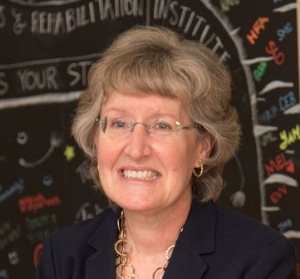Interview With Dr. Cathy Rasmussen of Nazareth College

Cathy Rasmussen, Ph.D., CCC-SLP, is Associate Dean in the School of Health & Human Services and Director of the York Wellness & Rehabilitation Institute at Nazareth College in Rochester, NY. She was formerly chair of the Communication Sciences & Disorders Department and co-directed the Deafness Specialty Preparation program conducted jointly by Nazareth and the National Technical Institute for the Deaf. A former president of the National Cued Speech Association, she is a certified instructor of Cued Speech and trainer of instructors. She has presented numerous times for local, statewide, and national audiences.
Note: You should consult with your doctor or speech pathologist for recommendations on treatment. The views and opinions expressed in this article are those of Dr. Rasmussen and do not necessarily reflect the official policy or position of SpeechPathologyMastersPrograms.com
How did you become interested in interprofessional curriculum development?
Nazareth College has a unique constellation of therapy programs: speech-language pathology, social work, and nursing were among the earliest disciplines here; physical therapy, occupational therapy, creative arts therapy (music and art), play therapy were added later. It was a very natural progression for colleagues to explore collaboration and to work together to help students from all professions understand the roles of others. Through the early work of faculty with this vision, interprofessional education (IPE) at Naz incorporates both academic coursework and collaborative practice opportunities, both on and off campus, for hundreds of Naz health and human services students annually. As a speech-language pathologist and communicative sciences and disorders (CSD) faculty member and chair, it was a great pleasure to see this take shape before IPE became a trend nationally, and to have the chance in recent years to work with colleagues to innovate and expand our robust programs.
How has our understanding of the benefits of IPE expanded in recent years?
At Nazareth College, we’ve seen IPE expand to include more disciplines. We have become more aware of the benefits to students as part of their professional preparation, and are assessing these, but are also seeing important benefits for faculty working collaboratively. We are also hearing from clinicians in a variety of settings in the field about the impact of interprofessional attitudes and skills of our graduates as they enter the workforce. Analysis of the effects of IPE practice on outcomes for our clients and patients is also an area of great interest. Last, but not least, we are curious about the effects of IP practice on self-care for professionals.
Are there certain professions who have spearheaded a move towards this increased collaboration?
Our experience at Nazareth may be somewhat different than national trends, but we’ve seen great IP efforts involving “traditional” collaborators, such as physical therapy (PT) and occupational therapy (OT), PT and Speech, but also innovative work with teams of music therapists and speech-language pathologists, art therapists and social workers, for example. For us, it would be hard to pick those professions who have spearheaded collaboration because we have such good participation and leadership from all of the professions represented here.
What have you learned from working with other professionals to develop interprofessional education?
All of us together are smarter than each of us individually! I’ve learned SO much about what other professionals do and what they bring to the therapeutic process. The impact of our work, when we do it collaboratively and in consultation with others who have the same overall goals and different lenses and perspectives, is inspiring and sustaining.
What are some of the challenges of implementing IPE in the classroom?
We think about this a great deal. How to make IPE real and relevant for multiple professions? How to break down traditional professional walls/siloes. Finding the best places to implement IPE. Doing meaningful assessment of IPE efforts. Where do we get the most “bang for the buck”?
The challenge faculty mention most often is the time to develop and implement collaborations. Everyone wants to do it; finding the time in already-busy schedules is tough. We’re tried to make this a priority.
What are some of the most important attributes of a successful IPE curriculum?
In our experience, it’s been critical that everyone understands the tenets and principles of IPE. We’re very proud of our faculty training opportunities and how we’ve infused IP concepts into our curriculum. In addition, we think it’s important to have opportunities to apply IP concepts and to put them into practice in a mentored and supportive environment. Scaffolding of academic and clinical work is the foundation for the development of attitudes, knowledge, and skills.
Our IPE/P opportunities include academic coursework, clinical opportunities on and off campus, specialty programs with IP content and audiences (deafness, autism, early intervention (EI), etc.), short-term service trips abroad, and interprofessional student organizations. We’re really fortunate to have a world-class, state-of-the-art facility at Naz, the York Wellness & Rehabilitation Institute, that brings together all of our clinical programs and supports our collaboration.
What aspect of your work are you most proud of?
It’s such a pleasure to see teams of faculty develop innovative new programs and then to see the outcomes for students! We love hearing from our graduates that the knowledge and skills they gained here helped to make them effective clinicians and leaders in the workplace.
What is your advice for future SLP students?
Dive in! Take advantage of every opportunity to participate in IPE and collaborative practice. Look for those places that are making it an integral part of the student experience to better prepare you for your career.
Sponsored online speech pathology programs

Online MS: Pursue SLP Certification. Study FT/PT
Speech@Emerson enables you to earn an MS online and pursue SLP certification in as few as 20 mos. Learn the same curriculum as the on-campus program. Study FT or PT.
- Prepares you to pursue certification as an SLP generalist
- In-person clinical placements at faculty-approved partner sites
- As few as 20 months to complete
SPONSORED

Want to Become an SLP? Earn an MS Online at NYU
NYU Steinhardt’s online master of science program in Communicative Sciences and Disorders prepares aspiring speech-language pathologists with a comprehensive professional education.
- Prepares students to pursue SLP licensure
- Accredited by ASHA’s Council on Academic Accreditation
- As few as six terms to complete
- Full-time and part-time plans of study
SPONSORED

Online MS in Speech-Language Pathology from Pepperdine University
Pepperdine University’s online Master of Science in Speech-Language Pathology program combines a robust, innovative curriculum rooted in Christian values with a full-time or part-time option that features online learning, on-campus intensive experiences, and comprehensive clinical field practicums to prepare skilled, compassionate students for careers as speech-language pathologists.
- Full-time (five trimesters) or part-time (eight trimesters) options available.
- No GRE scores required.
- 400+ supervised, clinical learning hours are done at schools/clinics local to students
- Three onsite experiences build a sense of camaraderie and community throughout the program
SPONSORED

